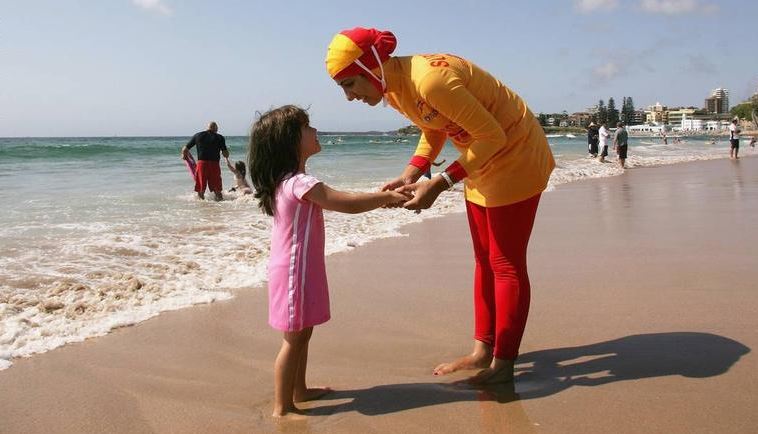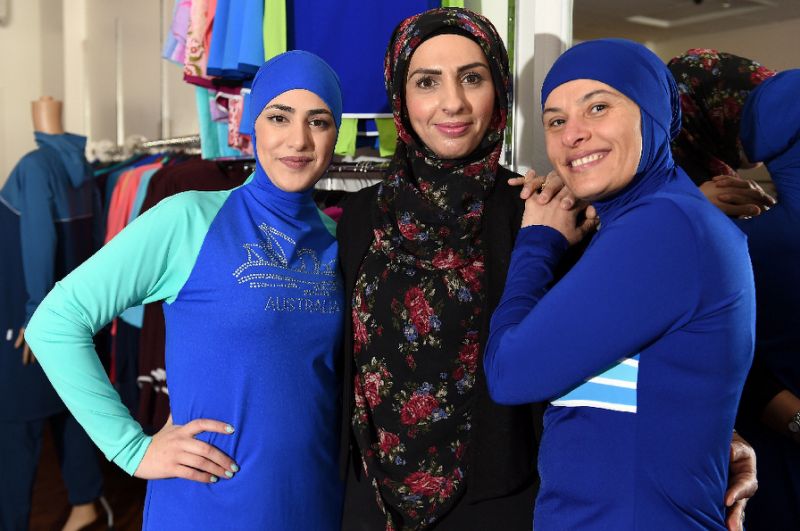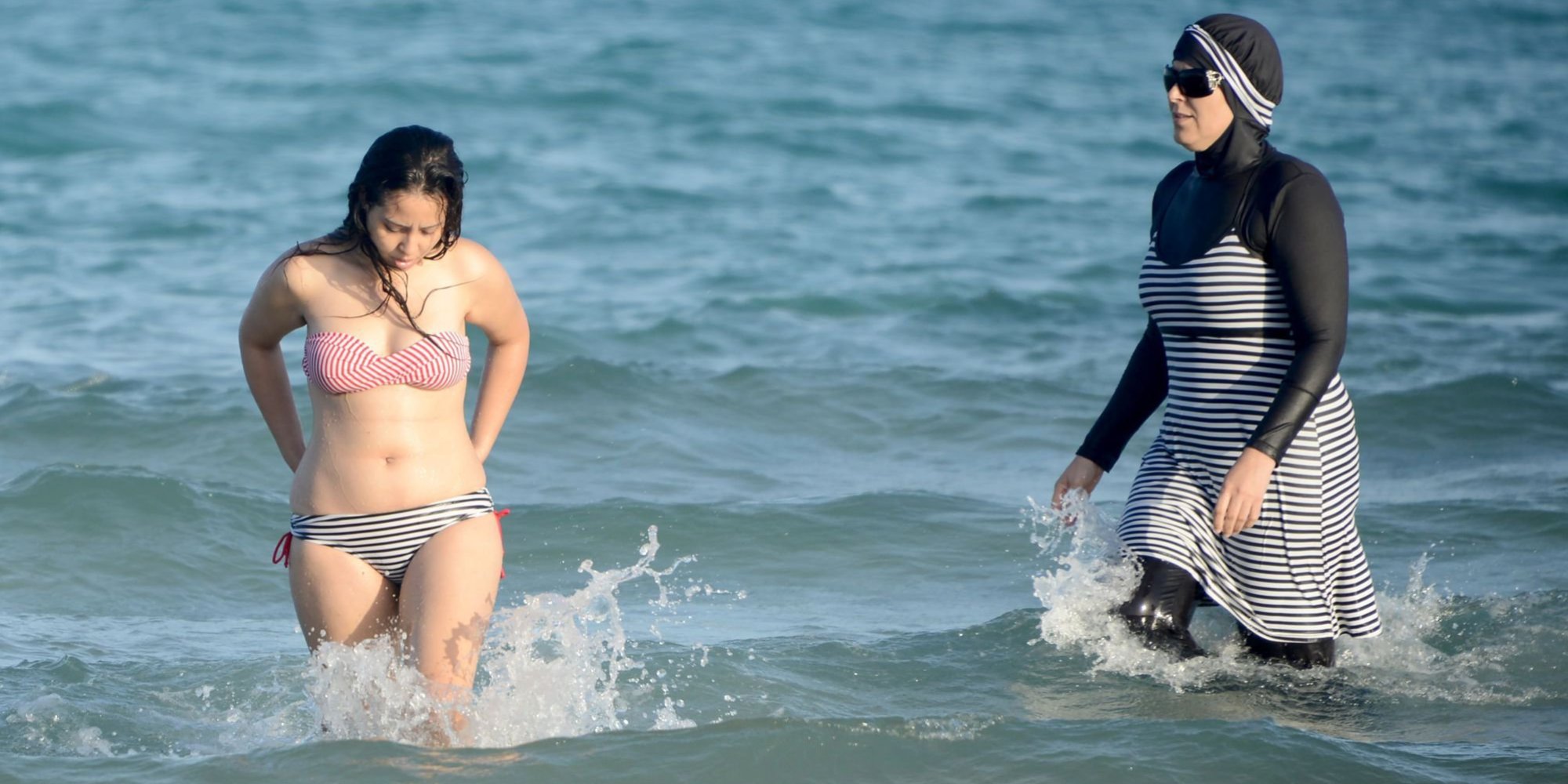So far, five French towns have banned burkinis – swimwear for Muslim women who want to enjoy the sea under their own conditions in terms of body coverage – on their beaches. Three more towns plan to follow. The main arguments used to legitimise this measure are the secularism of French society and both hygiene and safety concerns. However, the burkini ban is about none of these things. As the case has sparked debate in several European countries, it once again becomes clear that this discussion is about the war on women’s bodies, used by both sides in the everlasting latent conflict between Islamic fundamentalists and radical Western ‘freedom’ defenders.
‘Symbol of Islamic extremism’
The words ‘hygiene’ and ‘ safety’ were mumbled by mayors of the towns to explain their measure, but it didn’t take long before their actual motives came out. The mayor of Cannes, a French Riviera city, stated in the beginning of August that burkinis were a symbol of Islamic extremism and ‘could risk disrupting public order while France was the target of terrorist attacks’. Thierry Migoule, the head of municipal services of Cannes, even went as far to say that burkinis somehow stand for ‘an allegiance to terrorist movements which are at war with us’.

The mayor of Villeneuve-Loubet, another French Riviera resort, tried to get away with the decision for a burkini ban by refering to ‘sanitary reasons’, but then quickly decided to become an Islamic scholar by deciding what Islam demands: “In France, one does not come to the beach dressed to display one’s religious convictions, especially as they are false convictions that the religion does not demand.” The French prime minister has backed the decisions of the mayors of the five towns, stating that the burkini is based on the ‘enslavement of women’, as reported by The Independent.
The idea that women bathing in burkinis are showcasing their allegiance to terrorist organisations such as the Islamic State is utterly ridiculous. Do you really think IS-sympathizers or Islamic fundamentalists would let their wives out of the house and go to the beach to have fun and swim with all those infidels? In a burkini that has the potential horrifying threat of showing off a woman’s body curve when wet?
That French society has been deeply fractured by the terrorist attacks the country faced in the last year and a half is no surprise. It has endured the attack on satirical magazine Charlie Hebdo in January 2015, the Paris attacks in November of that same year, causing more than 150 deaths, and the most recent attack on the boulevard of Nice, causing 84 deaths this July. Combined with incidents on a smaller scale on French ground and attacks in both Belgium and Germany, once again, European Muslims find themselves in the middle of a heated debate. More specifically, women and the way they dress themselves.
The thing is, I don’t know what is more terrifying. Terrorist attacks by the Islamic State or governments thinking they are going to stop this threat by excluding modern Muslim women from their beaches.
‘Please show more skin’
One can write a library full of books about the French and their interpretation of secularism, or as they call it: laïcité. It has been forbidden to wear ‘conspicuous’ religious symbols, such as hijabs, in all public functions since 2004. In 2010, it banned face covering veils in public places. The line between ‘conspicuous’ and ‘inconspicuous’ religious symbols continues to be a line of debate until this day. As the New York Times writes, this line is even thinner when it comes to the burkini:
“There is no legal definition of the burkini. Typically many Muslim women,
who do not want to spend 40 to 125 euros for a burkini, wear a T-shirt and
long pants. Some even take off their hijab, others put on a bathing cap.”
So, you know what is going to happen when a woman is caught wearing something close to a burkini – like, I don’t know, a baggy wetsuit with a swim cap – on the beach? The police officer is going to tell them the following: “Sorry ma’am, you are not showing enough skin. Please take off some of your clothes or I will have to give you a fine.” And by ‘women’ and ‘them’ I refer to women who are most likely to be profiled as Muslims: women of colour.
What about white women wearing wet-suits and swim caps? Can they simply continue wearing them? Because they are not Muslims? That, ladies and gentlemen, is the text book definition of discrimination.
Free choice

What is the difference between the French authorities’ decision and the Iranian ‘morality’ police telling Muslim women that they are showing too much skin? What is the difference between forcing a woman to put something on – or take something off? Both take away her freedom of choosing how she presents herself and her body. Western ‘freedom’ defenders think that they are better because they are here to ‘free’ those women. You do not free women by telling them what their freedom looks like. Even if body coverage in the form of a burqa, niqab, hijab or burkini cannot be seen as a complete free choice due to the societal and religious doctrines, you do not free women by targeting them through discriminatory laws that, once again, leave them no choice.
The burkini ban is a shame. It doesn’t only discriminate and target Muslim women, it also takes away the focus on the real issue here. Rather than modern Muslim women in burkinis on the beach – trying to find compromises between the society that they live in and their religion – we should care about those women who are held hostage by their husbands, who are in danger of taking their children to Syria and Iraq, or who could be actually facilitating terrorist attacks on European ground. When discussing those matters, there is no room left for white French men deciding it’s their time to free those poor Muslim women out of their enslavement – or as they call it: their burkini.
A discussion of the freedom of choice of Muslim women – a discussion still highly relevant – can never be won by creating laws to ‘free’ them from their own conscious.







Comments (0)